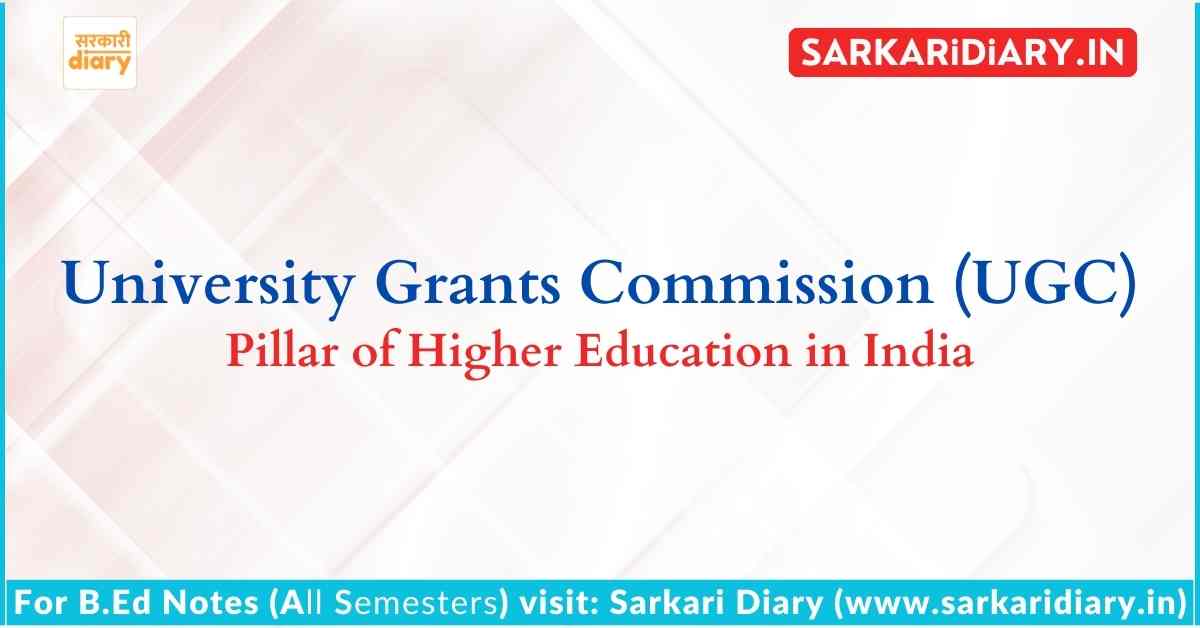University Grants Commission (UGC) is a statutory body in India, established with the aim of coordinating, determining, and maintaining standards of higher education across the country. It plays a pivotal role in disbursing funds and promoting the growth and development of universities.

Historical Background
The idea of setting up a central authority to oversee university education in India was first mooted by the University Education Commission of 1948, chaired by Dr. S. Radhakrishnan. The commission emphasised the need for an expert body to oversee funding and coordination among universities.
Although an advisory committee was already functioning since 1945, it lacked independent financial authority. Acting on the recommendations of the Radhakrishnan Commission, a non-statutory UGC was formed in 1952. However, due to growing demands from Vice-Chancellors and state education ministers for a statutory body, the UGC Act was enacted in 1956, making the commission a legal and autonomous entity.
Composition of the UGC (As per the UGC Act, 1956)
| Category | Number of Members |
|---|---|
| Vice-Chancellors | 3 |
| Central Government Officers | 2 |
| Eminent Educationists/Academicians | 4 |
| Total Members | 9 |
In addition, the commission includes:
- A full-time Chairman
- A full-time Vice-Chairman
- A Secretary, responsible for authenticating decisions
- Other officers and staff within its Secretariat
Functions of the UGC
The University Grants Commission performs a wide array of functions critical to the functioning and enhancement of higher education in India. Key responsibilities include:
Core Functions of UGC
| Function | Details |
|---|---|
| Financial Oversight | Inquires into the financial needs of universities and allocates/disburses grants accordingly. |
| Academic Advisory | Advises universities on necessary measures to improve the quality of education. |
| Government Liaison | Recommends grant allocations to Central/State Governments from their consolidated funds. |
| Policy Consultation | Offers advice on the establishment of new universities or expansion of existing ones. |
| Data Collection | Gathers information on higher education in India and abroad to guide academic planning. |
| Regulatory Compliance | Requires universities to submit data on financials, academic branches, and examination standards. |
| Quality Assurance | Can inspect university departments to assess teaching, research, and examination standards. |
| Penal Action | May withhold grants if a university fails to comply with recommendations within a reasonable time. |
UGC Guidelines on Distance and Correspondence Education
To support the expansion of higher education through distance learning, the UGC has introduced detailed guidelines:
| Guideline | Description |
|---|---|
| One University per State (UG level) | Only one university in each state may offer undergraduate correspondence courses. |
| Well-established Departments Only | Only reputed departments should initiate distance learning courses. |
| Priority to Study Centres | High priority for establishing centres in student-dense regions. |
| Contact Programmes | Mandatory provision of in-person support through contact sessions. |
| Funding Allocation | Grants provided for study centres, staff, lesson writing, libraries, etc. |
| Postgraduate Courses | Only experienced universities (in UG distance education) may offer PG programmes. |
| Financial Support | ₹1 lakh per subject per annum for up to 5 years for PG correspondence courses. |
Other Key Areas of UGC Development Support
The UGC extends its support to a variety of other educational initiatives aimed at inclusivity and innovation:
Development Initiatives Supported by UGC
| Area | Focus |
|---|---|
| Adult Education Programmes | Literacy and continuing education for adults |
| Cultural and National Collaboration | Promotion of cultural programmes and inter-university collaboration |
| University Services and Instrumentation | Development of infrastructure and equipment |
| Faculty and Student Development | Programmes like COSIP, COHSSIP to improve teaching and student amenities |
| Support for Autonomous Colleges | Encouragement and financial aid to promote academic autonomy |
| SC/ST Education | Reservation of seats and special facilities for Scheduled Castes and Tribes |
| Women’s Education | Promotion of higher education opportunities for women |
Vision for the Future
The Kothari Commission (1964–66) underlined the need to empower universities with greater autonomy, stating that UGC should not only fund but also support academic freedom. This autonomy is seen as essential to raise the standards of teaching, research, and innovation in Indian universities.
Conclusion
The University Grants Commission stands as a cornerstone of India’s higher education system. Through funding, policy guidance, and regulatory oversight, the UGC ensures quality education, equitable access, and nationwide academic coherence. As India continues to expand its knowledge economy, the UGC’s role remains ever more critical in shaping the educational landscape.